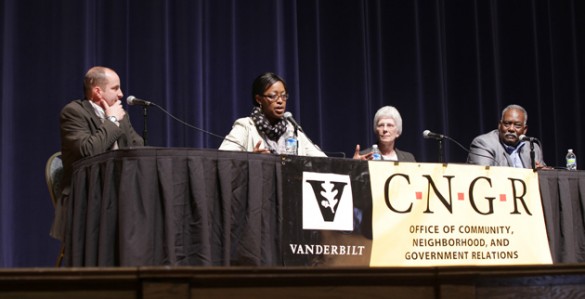To better ensure that student-athletes get the full measure of their college educations, we need to change the messages we send to them, said a panel examining the role of intercollegiate athletics in the mission of higher education April 3 at War Memorial Auditorium.
David Williams II, vice chancellor for university affairs and athletics and athletic director, moderated the discussion, which featured Virginia Shepherd, professor of pathology at Vanderbilt and co-chair of the Coalition on Intercollegiate Athletics; Candice Lee, associate director of student athletics who oversees NCAA compliance at Vanderbilt; and Willy Daunic, a Vanderbilt alumnus and sports radio announcer for 102.5 The Game in Nashville. Vanderbilt’s Office of Community, Neighborhood and Government Relations sponsored the free lunch-and-learn event.
“I think we’re in a place right now where there’s a lot of pressure to show what our values are and how we’re connected to the mission of higher education, and I don’t know that we always do a good job of that,” Lee said. “It could be that sometimes we’re not telling the right stories.”
Instead of focusing on the potential fame and glory that come with big-time college athletics, players should focus on the lasting benefits that come with being student-athletes—such as the opportunity to receive an education while building character, developing leadership skills and contributing to a team.
“Unfortunately, there’s such a huge media glare—there’s so much money involved, the pressure to win is so high—it definitely gets us off track,” Daunic said. “We get away from the core, and I think it affects kids coming up. They only see the glow of the lights, and they get away from how they’re really going to benefit from being a college athlete.”
Another false message players receive from the media and those around them is that they, too, can succeed at the highest level.
“If you line up a hundred college basketball and football players and say, ‘How many of you think that you’re going to the pros?’ A hundred hands will go up,” Shepherd said. “Then if you say, ‘In reality, only two to five of you are going to the pros—so how many of you think it will be you?’ A hundred hands will go up. So there needs to be some reality checks.”
This proves difficult when the promise of success serves as powerful motivation for players. “I once had a basketball coach tell me … ‘As long as a player thinks there’s that one chance he could go pro, I’ll get the best out of him. Once they realize there is no after, I’m going to have a hard time keeping him in the program,’” Williams said.
Williams cited last year’s SEC men’s basketball championship as a striking contrast between two models for intercollegiate athletics. Vanderbilt’s team of senior starters faced off against top-ranked Kentucky’s team of mostly freshmen, recruited with the promise of “one and done”—play one year, win a national championship, then turn pro. Not only did the Vanderbilt team win the SEC title, its players walked away with college degrees a few months later.
Kentucky went on to win the NCAA championship, with many of its young players leaving the university soon after. “We have nothing against Kentucky,” Williams said. “[rquote]They’re doing what they think they need to do. But comparing two models that two different schools use now—what does it hold for the future of college athletics?”[/rquote]
Shepherd said faculty need to take more responsibility for ensuring that the business of college sports doesn’t overrun the integrity of the collegiate experience.
“I think we probably haven’t pushed enough to ensure that this is truly still a collegiate model—that the primary goal of these kids is to come and get an education while they’re playing sports,” she said. “That’s not to say that we shouldn’t have a player pop out early and go on to a successful pro career, then perhaps come back. Maybe there are other models.”
